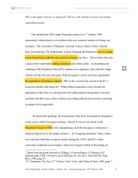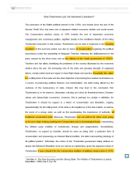What is politics?
What is politics? Many people hold contrasting views on the nature of politics. Politics can exist on many different levels. It can concern disputes within the workplace and home, to the way in which a state is run. Politics refers to the power struggles in government down to the small influences among peers. The Oxford Concise Dictionary states that politics is 'The art and science of government, a particular set of ideas, principles or commitments.' This is a sweeping definition that covers two key strands of thought as identified by Oakeshott and Crick. Michael Oakeshott, who is a modern philosopher, believes that politics is merely the organisation of the running of the state, which implies doing whatever is necessary to promote the wellbeing of the people. This leaves room for all types of rule such as totalitarian, democratic or theocratic. Oakeshott believes that the process and structure of politics is more important than the ideas behind it. Professor Bernard Crick believes that politics is a peaceful resolution of conflict. Disputes in ideas and Interests are solved through organised and legal methods that have been agreed beforehand. This then suggests that the opposite is some form of violence. This may be civil war, a form of armed conflict or Revolution. He believes the process by which politics is ruled cannot exist without the ideas and values behind it.
What is the role of Interest groups in Contemporary British Politics?
What is the role of Interest groups in Contemporary British Politics? This essay will address what interest groups bring to the political environment. This includes looking at differing types of interest groups and how they work in politics. The aims and ideologies of interest groups will be viewed and, how their relationships with political parties and government shape their role in contemporary British politics discussed. The degree to which the role is of importance at this current time and what positive and negative aspects the role brings to the political spectrum are issues to consider. These aims will ensure the essay discovers the role that interest group's play and if they are (and in what ways they are) a contributing addition to Politics in Britain. As there are a greater number of people who belong to pressure groups than to parties it is clear of their importance in society. These groups play a larger part in the influence of political and economic decisions than a superficial glance at political activity recalls. Definitions are of importance if we are to analyse and explore the role of interest groups. This helps create an understanding of what we are talking about when considering "interest groups". An interest group is a "group of individuals/firms which have shared interests/attitudes which articulate demands on political authorities"1 Also known
What is the Significance of the Disagreement between Neo-Realists and Neo Liberals?
GV1600: What is the Significance of the Disagreement between Neo-Realists and Neo Liberals? The debate between neo realists and neo liberals have developed from the realist and liberals explanations of international relations; neo realists have adapted and refined realism, and neo liberal ideas have arisen as a critique of realism and neo realism, and the both present conflicting viewpoints on post cold war world politics. The traditional liberal view on the international structure is that human nature is essentially altruistic, and war is not inevitable and can be eradicated by decreasing the anarchical conditions that encourage it; therefore if all international institutions engage in collective and multilateral efforts to cooperate, the world will be a better place. The neo liberals have developed this view by emphasising the need for reciprocity which is made capable by individual states making one initial cooperative move (characterised by Robert Axelrod as 'tit for tat'1) and if other states respond in the same way mutual cooperation can be formed. Neo liberals use the example of the 'Prisoner's Dilemma' to show how cooperation is the best solution: if two prisoners who are being interrogated by police for a crime decide to cooperate rather than compete and try to get released, then it is better for the both of them because their sentence would be shorter than if they




















